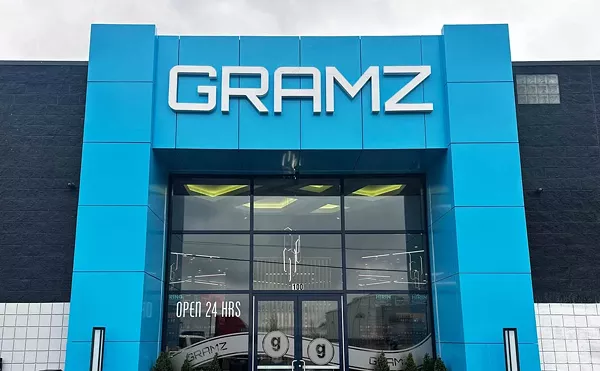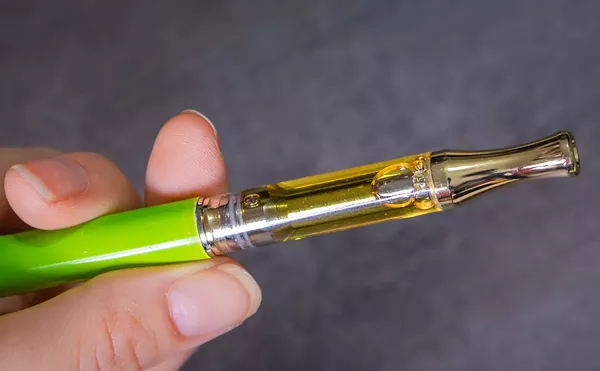The dispensary tour
These Michigan dispensaries are nondescript, businesslike and law-abiding

Audio By Carbonatix
[
{
"name": "GPT - Leaderboard - Inline - Content",
"component": "35519556",
"insertPoint": "5th",
"startingPoint": "3",
"requiredCountToDisplay": "3",
"maxInsertions": 100,
"adList": [
{
"adPreset": "LeaderboardInline"
}
]
}
]
Maybe there are marijuana dispensaries where clouds of smoke drift through the air behind beaded curtains as loud music pounds from speakers, dancing girls gyrate and heavy lidded smokers nod while reclining on overstuffed pillows.
Those kinds of places may exist, but I didn't see anything like that when I visited the People's Choice medical marijuana dispensary in Ann Arbor and the Trans Love Compassion Collective in Detroit. They are among the approximately 80 facilities currently operating in Michigan after last year's Court of Appeals decision in a Mount Clemens case prompted many of the nearly 400 outlets then in Michigan to shut down. (Some see a state Supreme Court readiness to hear an appeal of the appeals decision as an indication that the high court has a kinder disposition regarding dispensaries.)
People's Choice is in a nondescript area behind a Chinese restaurant near the intersection of West Liberty and Stadium. There is a growing equipment store next door that seems more flamboyant than the People's Choice. When I knocked a woman who later described herself as the "bulldog at the door" answered and asked if I had a Michigan medical marijuana card. When I didn't produce, I had to cool my heels at the door until the owner Ronald (Harry) Cayce, who was expecting me, came out to vouch for me.
There isn't much to the place and no smoke in the air; the rule is no smoking on the premises. There is a central hallway about 30 feet long with three or four small rooms to either side. Bulldog woman, one of three workers there when I visited, sat in a small office to the right. She checks and verifies the cards of all who enter.
"We look as closely as we can," says Cayce. "Everybody in here is a caregiver."
Pretty much everybody who works at these kinds of places is a medical marijuana patient or a caregiver. That was the case a couple of years ago when I visited Big Daddy's in Oak Park. There, nobody let me anywhere near any marijuana; I just got to see the business office and growing equipment that was on sale. At People's Choice I actually got to see plants, buds and edibles.
Aside from the reception area up front there is a room with seats and magazines that looks like a doctor's waiting room. Further back there was a room with a few small transplants under lights. A lot of People's Choice customers come in for transplants. Those are small branches cut from plants and put through a cloning process that makes them grow roots and become their own plants. Through cloning, growers can produce genetically identical female plants to known strains rather than the haphazard results obtained by using seeds. Female plants grow the THC-rich buds coveted by most medical and recreational users.
Speaking of buds, there is a bud room at People's Choice where patients get to examine and choose their buds. About a dozen small, clinical looking jars contain a bud or two each of various strains. Clients can peruse them, discuss their effects with the bud tender stationed in the area, and even read lab reports on the THC and CBD cannabinoid levels in each sample. THC is known for its pain reduction, and appetite inducing properties. CBD is known for anxiety, nausea and convulsion reduction,
"Everybody is looking for something that has 12 percent THC and 12 percent CBD," says Harry. "The European seed banks have pretty much bred the CBD out of the supply."
Everything is prepackaged here, from the most popular size — one gram — on up to the 2.5-ounce limit set by the Michigan Medical Marihuana Act. There are tinctures and oils made with THC extracts, and edibles range from the traditional brownies and cookies to pizza and lollipops. Harry says they get about 50 customers each day. During the late afternoon hour — I was there on a Tuesday — two folks came in, took care of their business and left quickly.
People's Choice is one of eight dispensaries licensed by the city of Ann Arbor. The dispensaries work together as an informal guild mostly to organize community events such as a food drive, painting park benches and pulling weeds at a senior center aimed at showing that they are good members of the community.
"We're trying to bring medication cost effectively to the patient while looking over our shoulders ever day," says Cayce.
Trans Love Energies in Detroit is an entirely different model for a medical marijuana facility. While People's Choice is a nonprofit, Holice Wood, co-owner of Trans Love, stresses that his place is a private club for card-carrying medical marijuana patients. Located on Gratiot Avenue between Russell and Riopelle across from Eastern Market, Trans Love is in one of a number of historic art deco buildings on the block undergoing a renaissance.
Trans Love Energies was an anti-establishment arts and media group started by John and Leni Sinclair during the 1960s. It began in Detroit and later moved to Ann Arbor. Indeed John Sinclair is Wood's partner in the new endeavor but has no hand in the day-to-day operation of the place. It's unclear what the actual business relationship is other than Sinclair lending his name, which is associated with marijuana activism, to the endeavor. Some of Leni Sinclair's photos of '60s and '70s rock stars hang on some walls. There's more music history here: The building is the former recording studio of KMS, the label created in 1987 by techno pioneer Kevin Saunderson and where Derrick May and Juan Atkins also recorded. In fact, May still maintains an apartment in the building complex.
The weekday afternoon I visited the facility Trans Love looked like a construction area inside. Wood and a guy who called himself Oak were putting in a kitchen and a bathroom, both with marble counters. Subfloors were exposed in a few areas waiting to be finished. There weren't any club members around although Wood says they could come in if they wanted. He has a schedule for when members, caregivers and prospective members can come in. Members can drop in from 2 p.m. to 6 p.m. Monday through Saturday. Members can procure medication at the site. Caregivers who have produced more than their patient can use can unload the overage there from 10 a.m. to 1 p.m. Mondays, Wednesdays and Fridays.
"We don't want them to mix with each other," says Wood. "Parking lot deals cause danger. I'm trying to provide a safe place where people can procure their medication."
Wood emphasizes that Trans Love is a private club, and the construction, slated to be done this week, focuses on that aspect. The new kitchen will serve meals (medicated and non-medicated) to members, prepared by three different chefs who work two days a week each. There is a partially covered outdoor courtyard with a small stage and room to accommodate about 40 or 50 people. Wood, whose other enterprise, Detroit Life (detroitlife313.com), is an artist management and publicity company, plans to have bands, poetry readings and the like in the courtyard. There will also be classes on how to build a grow room, cultivation and cooking with marijuana. When there is no entertainment folks will be able to watch cable TV on the courtyard screen.
"We don't have to push bud," says Wood. "Bud sells itself."
As we move forward in the medical marijuana world, and with the chance that Detroiters will decriminalize possession of small amounts of marijuana by adults on private property this fall, many are looking for a business model that works in their municipality — and under the shadow of a hostile state attorney general. People's Choice has opted for the small, no nonsense retail outlet where you buy your meds and go home. Trans Love looks more like the kind of place that has the anti-marijuana gang sweating. It's a place where club members access medication, entertainment, and learn about cultivation and cooking in a safe atmosphere.
You can choose your own medicine.
Larry Gabriel is a writer, musician and former editor of Metro Times. Send comments to letters@metrotimes.com.






